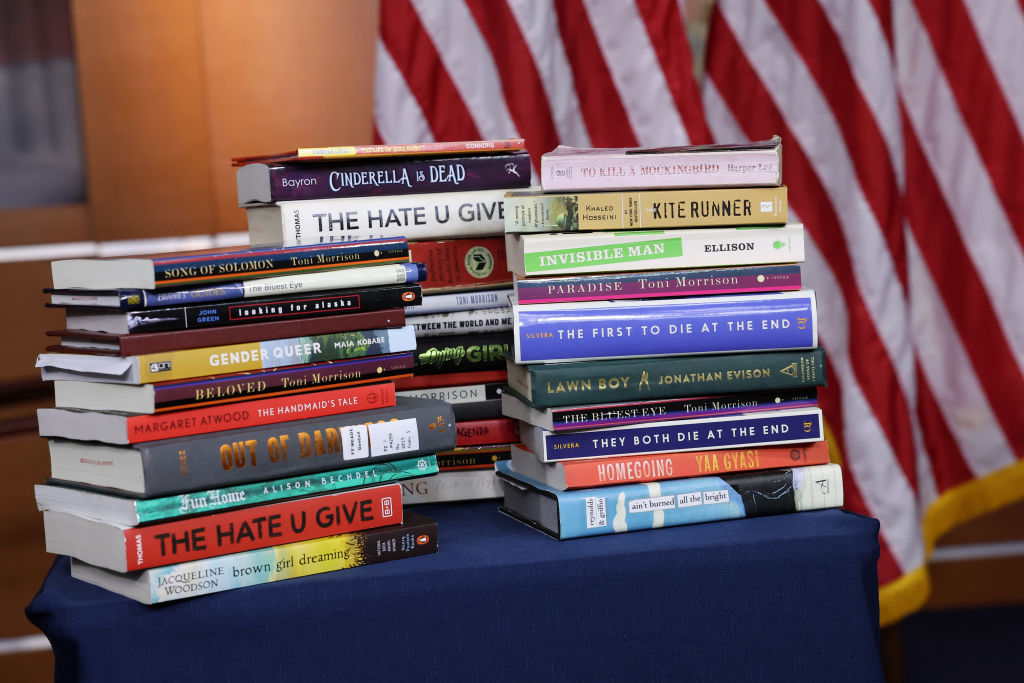- Another take on why conspiracy theories have become so popular;
- How home-schoolers who decided to send their kids to public schools exposed the three lies about home-schooling that convinced them to do so;
- The Week on the state of book banning and criminalizing teachers;
- Heather Cox Richardson on fascism;
- And today’s music: a film score by Alexandre Desplat.
*
First, familiar material. The human inclination to cast everything in terms of narrative (stories) has always been with us. So why is it they seem to be taking over? The effects of social media? No, something more, this writer says.

Salon, Christopher T. Conner, 21 May 2023: How did conspiracy theories explode in popularity? It all boils down to narratives, subtitled “‘Alternative,’ unscientific narratives like QAnon are more popular than ever. A sociologist explains what happened”
The last three years have revealed a strange, fundamental truth about American society: we do not exist in a world where we all perceive the same reality. Rather, we exist in a universe of competing beliefs about the nature of the world. And for myriad reasons — including the fundamental way that the internet shapes our reality and provides alternative “facts” to every conceivable scenario — there is no shortage of sources that bolster these competing worldviews.
Hence, we’ve seen a rise, or at least acknowledgement, of “alternative beliefs” — ranging from election outcomes, folk cures for COVID, and even fantastical beliefs about Jewish space lasers. Some blame social media as the source of the rise of extremist beliefs. But, what if those with these views, and the divisions that stem from them, always existed? What if they would have likely existed even without being supercharged by social media?
…
Many social scientists and journalists are quick to paint a narrative which blames social media and other new communications technologies. There’s no doubt that new technologies have sped up the rate and reach of “alternative beliefs.” But just because an idea is available for public consumption doesn’t mean that people will necessarily adopt those ideas. There is something more happening here.
Conventional explanations are about how social conditions, issues with society, fears and desires of the public, that make people susceptible to alternative, simplistic interpretations of reality. More abstractly,
[O]ur ability to understand conspiracy theories is not an obscure art — there are entire fields devoted to it. The work done in these fields is key to undoing the damage of things like QAnon. Interpretive sociology and symbolic interactionism offers a framework that argues for the importance of narratives and stories in making sense of our everyday lives.
What’s new here the writer’s perceived need more scientists and academicians to reach the public. And in their absence the far-right’s narratives fill the void.
Academia, however, often does not reward public scholarship, and when it does it certainly isn’t at the rate that it rewards academic work likely only to be read by other social scientists. To critics of public scholarship, I point to the well-oiled integrated machine of the far-right, which has made significant advances in the last decade. Academia’s aversion to public scholarship has created a vacuum that has allowed for anti-scientific, anti-democratic, and even harmful information to go unchallenged and widespread.
\\
Washington Post, 30 May 2023: The revolt of the Christian home-schoolers, subtitled “They were taught that public schools are evil. Then a Virginia couple defied their families and enrolled their kids.”
Long, admittedly anecdotal, scary. With many photos. People who seal themselves into bubbles and lie to their children about what’s going on in the outside world. Believing things that aren’t true, as conservatives do.
Hemant Mehta has this take.

Friendly Atheist, 30 May 2023: The 3 lies that convinced two conservative Christians to stop home-schooling their kids, subtitled “Christina and Aaron Beall, products of conservative Christian home-schooling, are sending their kids to public school. Here’s why.”
Christina and Aaron Beall were both products of conservative Christian home-schooling. Christina graduated from the arch-conservative Patrick Henry College, which was founded by Michael Farris, who also founded the arch-conservative Home School Legal Defense Association. Aaron is a “self-taught web developer” who met Christina because their families both belonged to a religious community led by Gary Cox, another home-schooling advocate.
They grew up believing birth control was evil, Creationism is true, and dinosaurs were on Noah’s Ark. They also thought public schools were “indoctrination camps” run by the government in part to turn children against Christianity. So of course they assumed they would home-school their kids just as they were.
The turning point, however, came when they realized how badly they had been lied to by their Christian communities. I think these lies are really worth focusing on because the Bealls were True Believers™ who still couldn’t reconcile what they were taught with their lived experience, and they took the risk of following their gut instead of tradition.
I’ll just list the three lies Mehta extracted from the much longer WaPo article.
- Lie #1) Physically abusing your children is a proper form of discipline.
- Lie #2) Questioning the existence of God is the result of trauma.
- Lie #3) The public schools are anti-Christian bastions of immorality.
Really?? is my reaction. Why isn’t questioning the existence of Zeus a result of trauma? (Because that’s not about rejecting inculcation by the local culture?) These people have no imagination, or breadth of knowledge. But the most striking point is the third. One of the children in this family, upon enrolling in a public school, observed,
“People who think the public schools are indoctrinating don’t know what indoctrination is. We were indoctrinated,” Aaron says. “It’s not even comparable.”
That’s what it looks like to all of us outside their bubble. (Of course, another broader issue is why so many people around the world, who haven’t attended Christian home-schooling, are not by any apparent criteria immoral.)
Mehta concludes with a number of qualifying comments, such as,
Public schools, like all institutions, have flaws. They aren’t and shouldn’t be immune from criticism. But the Christian Right has spent decades lying about the extent of those problems to an audience of believers predisposed to hating anything connected to the government. They demonize hard-working teachers and administrators and try to take over school boards in order to replace expertise with right-wing indoctrination.
What always strikes me about these situations is how the world, in such parents’ minds, is divided into two: their own particular religion on the one hand, the entire evil secular world on the other. It’s simplistic, insular, black and white thinking at its worst.
\\\\\
One more along a similar theme. Here’s an item from The Week, which specializes in summary articles that capture the key points of various social trends.

The Week, 27 May 2023: Censoring ideas and rewriting history, subtitled “Several states are banning books and criminalizing the teaching of controversial topics. What’s become verboten?”
Is censorship growing? Yes.
Where is this happening? “[B]y Republican-controlled legislatures” in various states.
Do most parents support this?
No. A Fox News poll released in April revealed that 77% of parents were “extremely” or “very” worried about book bans. Other polls found that about 80% of both Republicans and Democrats say books should never be banned for discussing race, slavery or critical views of U.S. history.
(Republican legislatures apparently don’t care.)
And finally, Going after publishers.
Starting July 1, publishers who sell or distribute books with “sexually explicit” material to Tennessee schools face felony charges and fines of up to $100,000 per violation. Lawmakers in Texas and Oklahoma are considering new age-based restrictions on publishers who want access to their public schools. Some companies already are letting state laws influence editorial decisions.
\\\
Let’s not comment on the above, instead note this.
Heather Cox Richardson, Letters from an American, 29 May 2023
It begins,
Beginning in 1943, the War Department published a series of pamphlets for U.S. Army personnel in the European theater of World War II. Titled Army Talks, the series was designed “to help [the personnel] become better-informed men and women and therefore better soldiers.”
On March 24, 1945, the topic for the week was “FASCISM!”
“You are away from home, separated from your families, no longer at a civilian job or at school and many of you are risking your very lives,” the pamphlet explained, “because of a thing called fascism.” But, the publication asked, what is fascism? “Fascism is not the easiest thing to identify and analyze,” it said, “nor, once in power, is it easy to destroy. It is important for our future and that of the world that as many of us as possible understand the causes and practices of fascism, in order to combat it.”
Fascism, the U.S. government document explained, “is government by the few and for the few. The objective is seizure and control of the economic, political, social, and cultural life of the state.” “The people run democratic governments, but fascist governments run the people.”
Her piece goes on in that vein, letting any conceivable connection between that pamphlet from 78 years ago and events today as an exercise for the reader.
\\\
This afternoon’s music. Elegant, delicate. The film included a number of classical music cuts — from Mahler’s 1st, from the Moldau — but Desplat’s original music is beautiful, occasionally chilling, and stands very well on its own.






